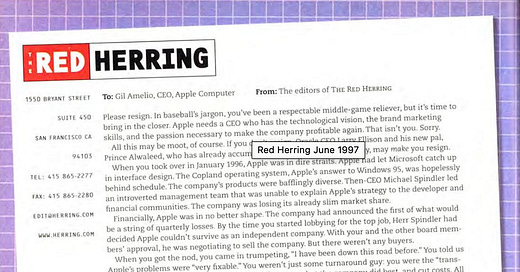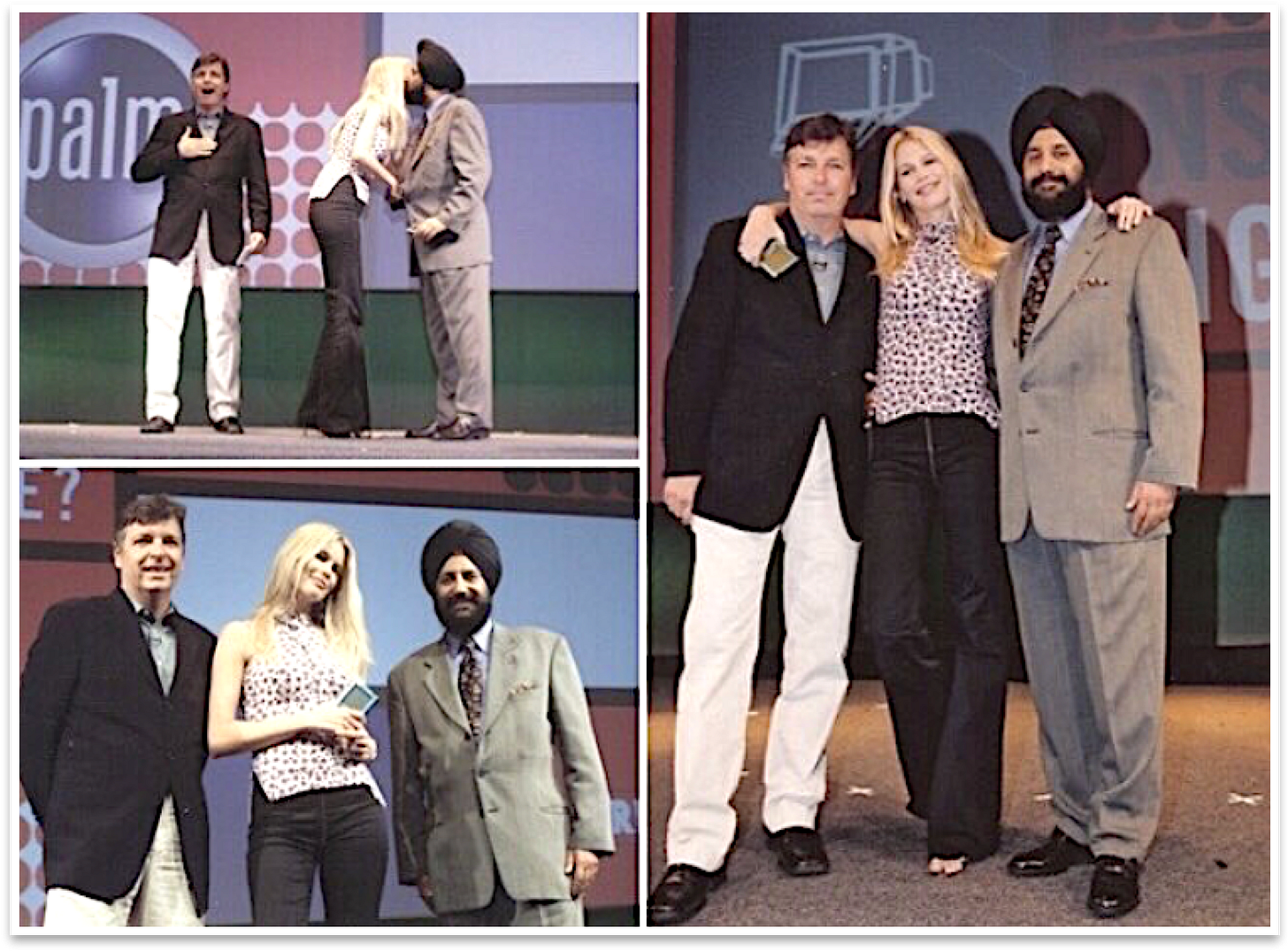To: Gil Amelio, CEO, Apple Computer
From: The editors of THE RED HERRING
Please resign. In baseball's jargon, you've been a respectable middle-game reliever, but it's time to bring in the closer. Apple needs a CEO who has the technological vision, the brand marketing skills, and the passion necessary to make the company profitable again. That isn't you. Sorry.
All this may be moot, of course. If you
LacrO Larry Ellison and his new pal.
Prince Alwaleed, who has already accum
Red Herring June 1997
y, may make you resign.
When you took over in January 1996, Apple was in dire straits. Apple Had let Microsoft catch up in interface design. The Copland operating system, Apple's answer to Windows 95, was hopelessly behind schedule. The company's products were bafflingly diverse. Then-CEO Michael Spindler led an introverted management team that was unable to explain Apple's strategy to the developer and financial communities. The company was losing its already slim market share.
Financially, Apple was in no better shape. The company had announced the first of what would be a string of quarterly losses. By the time you started lobbying for the top job, Herr Spindler had decided Apple couldn't survive as an independent company. With your and the other board members' approval, he was negotiating to sell the company. But there weren't any buyers.
When you got the nod, you came in trumpeting, "I have been down this road before." You told us Apple's problems were "very fixable." You weren't just some turnaround guy: you were the "trans-formation man." You would simplify Apple, focus on what the company did best, and cut costs. All you asked for was "100 days," and you would present your plan.
But in the end your plan wasn't much different from Herr Spindler's: focus on multimedia and the Internet, and cut 2,000 jobs.
More than a year later, we can see the results of your miscalculations. You have been forced to lay off an additional 4,000 employees. On April 16 Apple posted a $708 million net loss for the second quarter of 1997. Revenues were $1.6 billion, down from $2.2 billion the previous year. You promised this would be "the turnaround quarter." Instead, Apple is bleeding out.
You have badly mismanaged Apple's crown jewel, the Mac OS (for a full account, see "Keeping the Doctor Away," page 34). You let Steve Jobs seduce the board of directors and pick Apple's pocket for an incredible $430 million. All to acquire an obscure branch of Unix that had been on the shelf for more than two years and a $50 million niche software company that never made a dime.
For all the high theater of Mr. Jobs's return and the undoubted technical superiority of the NextStep OS, this was not the visionary solution that Apple required. If the world still needs a monolithic operating system-something by no means certain-that OS is inevitably Windows.
Perhaps Apple should have committed to building an insanely great Java platform and looked to the growing community of java developers to replace the dwindling ranks of Mac programmers.
But whatever the choice, Apple wants a leader who can convincingly explain the company's technological vision. You do not have the intellectual vigor.
Managing the Apple brand is one of the most important roles of the Apple CEO, and here, too, you have been an uninspiring manager. A bold chief executive might have done as John Sculley suggested in these pages and attached the Apple brand to other devices, like digital TVs, network computers, and even Wintel desktops and PowerBooks. But this kind of big-brand marketing requires a keen sense of product packaging and the imagination to create dramatic marketing campaigns. We don't see this as one of your fortes, Mr. Amelio.
In short, we believe you could do Apple a tremendous service by helping to recruit a new CEO.
Here are a few names you might consider. How about Carl Stork, Microsoft's Windows general manager, who made his name as Redmond's liaison to the hardware manufacturers? Since Apple is all about integrating hardware and software, and because Apple will continue to rely on Microsoft for much of its application software support, he could be a great choice. Another interesting candidate might be the president of Sony Electronics USA, Carl Yankowski, who thoroughly understands computers and consumer marketing and who has made Sony profitable again. Or perhaps Peter Sealy, the former executive vice president of Coca-Cola-very technology savvy as well as great at brand building.
You're not up for the job. Although you have a superior adviser in Steve Jobs, our sources say he is quietly sabotaging your efforts because he doesn't respect your abilities. Our gut tells us Mr. Jobs may be working on the inside to pave the way for the investor group spearheaded by Me, Ellison.
It may already be a done deal. We respectfully suggest you declare victory and move on.





